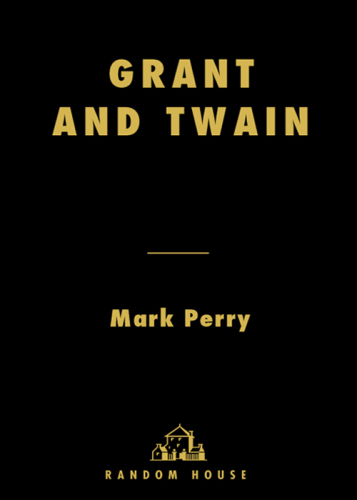
Grant and Twain
The Story of a Friendship That Changed America
فرمت کتاب
ebook
تاریخ انتشار
2004
Reading Level
8
ATOS
9.4
Interest Level
9-12(UG)
نویسنده
Mark Perryشابک
9781588363886
کتاب های مرتبط
- اطلاعات
- نقد و بررسی
- دیدگاه کاربران
نقد و بررسی

March 8, 2004
The friendship of Ulysses S. Grant and Mark Twain by no means changed America. It was, however, a remarkable and fascinating relationship that, though already intelligently told in numerous other volumes, is related quite well here. As Perry (A Fire in Zion: The Israeli-Palestinian Search for Peace
) relates it, in 1881 Twain urged Grant—out of office and out of favor—to write his memoirs, but Grant refused. He reminded Twain that two accounts of his military exploits (by other authors) had been unmitigated flops. A few years later, bankrupt and afflicted with agonizing throat cancer, Grant finally agreed to write four articles for the Century Magazine
on some of his Civil War battles. The Century
also offered to publish his memoirs. Twain, on hearing Grant might be willing to write a book, hurried back to New York from a lecture tour to scoop the project away from the Century
and arrange for publication by a small firm he controlled. Once the deal was done, Grant labored in a grim race to finish his narrative before cancer finished him. He completed his story—a masterpiece of fluent directness containing absolutely vital insights on Union army command strategies—in July 1885 and died soon after. Published a few months later, the Memoirs
have never since been out of print. Perry does an excellent job of narrating Grant's and Twain's parallel lives and showing how their intersection at the end of Grant's life led to the creation of an American classic. 16 pages of b&w photos not seen by PW
. Agent, Gail Ross.

May 1, 2004
Between May 1884 and July 1885, an unlikely friendship developed between two of America's most recognized personalities. As Perry (Lift Up Thy Voice) observes, the two men could not have been more different: Ulysses S. Grant was reticent and taciturn, while Mark Twain was flamboyant and a prodigious talker. When the two first met at a presidential reception, Twain found himself tongue-tied. But he soon overcame his initial shyness to become Grant's publisher and writing mentor. In workmanlike fashion, Perry chronicles the hardships (tongue cancer, financial failure) that provoked Grant to complete his memoirs hurriedly and the perspicacity that motivated Twain to act on his friend's behalf, revealing Grant's work to the public while he struggled to finish his own masterpiece, The Adventures of Huckleberry Finn. Although the stories in this book will already be well known to Grant and Twain aficionados, Perry's juxtaposition of the two writers' careers does offer a glimpse into the development of cultural history in late 19th-century America. On the other hand, Perry's assertion that Grant's Memoirs is the "single most important work of nonfiction in our literature" is a grandiose generalization that is at once provocative and na ve. Recommended for large public libraries. Henry L. Carrigan Jr., Lancaster, PA
Copyright 2004 Library Journal, LLC Used with permission.

October 1, 2004
Adult/High School -Despite the hyperbole that appears throughout the book, this is an engaging look at two American icons. Grant, like many people during the 1880s, was devoted to the idea of amassing great wealth. He joined a business partnership to which he contributed little beyond his own fortune and the luster of his name. When his partner proved to be a swindler, he had staggering debts and watched newspapers savage his good name. He became obsessed with finding a way to pay what he owed, insure his family's financial security, and restore his honor. When he was offered the opportunity to write a series of articles about his great Civil War battles, he felt compelled to comply. Twain, learning of a forthcoming offer for Grant's memoirs, determined that he would edit and publish them himself. Like Grant, he was suffering from financial reversals, and he had put aside a new book he had begun, The Adventures of Huckleberry Finn . The two encouraged and inspired one another during the production of their greatest works. Perry shows readers new sides of these men in biographical sketches that precede the story of their friendship. The people and events of the Gilded Age are vividly portrayed with a wealth of original source material. Readers who have been daunted by the length of Grant's memoirs or by Huckleberry Finn may be encouraged by Perry's enthusiasm to read them. Thirty photographs and drawings are included.-Kathy Tewell, Chantilly Regional Library, VA
Copyright 2004 School Library Journal, LLC Used with permission.

April 15, 2004
It's hard to imagine two figures more emblematic of nineteenth-century America than Mark Twain and Ulysses S. Grant, and it's fitting for the era that the convergence of the two icons had much to do with mutual financial self-interest. Lifelong fighter Grant, withering under throat cancer and impending bankruptcy, wages with his " Personal Memoirs" one last battle for his pride and his family's financial solvency. Twain, well accomplished but living perpetually beyond his means, likewise seeks to recapture the success of his early career by finally finishing " Huckleberry Finn." 1885 saw the two men visiting nearly every day, Twain's support and editorial skills coaxing out the general's Civil War narrative while quietly elucidating for Twain the impulse toward emancipation, symbolized by Grant, that guided Huck and Jim's raft. Perry's narrative is a double biography emphasizing the overlap between the two illustrious men's lives and consistently implying the consequences this friendship had on America.(Reprinted with permission of Booklist, copyright 2004, American Library Association.)

























دیدگاه کاربران